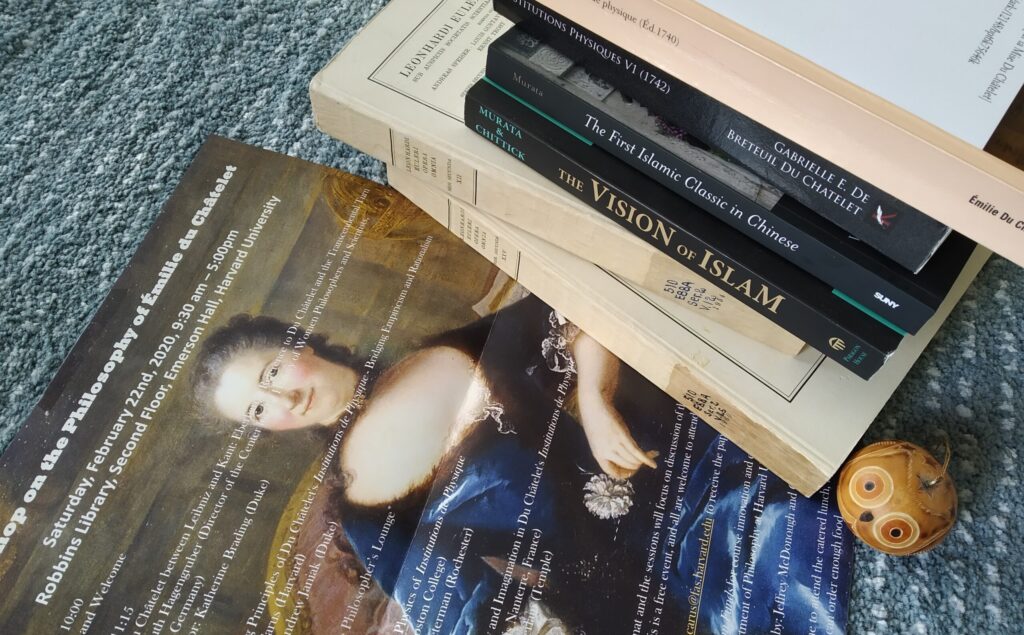Research Summary
I have two main research programs. One lies in the intersection of early modern philosophy and the history and philosophy of science, another is in Chinese philosophy. They are both inspired by the recognition that the historiography of philosophy—in the Western and Chinese traditions alike— unjustly ignores many non-canonical figures, so I am committed to addressing this problem through my own work.
QL
Towards a New Phase of Du Châtelet Scholarship: from Institutions de Physique (1740) to Institutions Physiques (1742)
There is a mysterious two-fold change in Du Châtelet’s position on Newtonian attraction: from acceptance thereof as an explanatory principle in Essai sur L’Optique(ca. 1938-1939), to rejection in the 1740 Institutions, and returning to acceptance again in her Commentary (1756) to Newton’s Principia. In this paper, I suggest that we turn to the 1742 Institutions for answers. There, Du Châtelet introduces physical explanation and maintains that we can appeal to certain physical qualities (such as attraction) for explanatory force. Using this case study, I argue in this paper that the scholarship will benefit greatly from turning to the 1742 edition going forward.
lsadfals;dkfj
Du Châtelet on relative and absolute motion [with Katherine Brading]
Absolute motion and absolute place are typically defined in terms of absolute space. Strangely, Du Châtelet defined absolute motion and absolute location in relation to “the entire universe considered as at rest”. Is she simply confused about the absolute/relative distinction that Newton drew, which he thought was key to theorizing about the true motion? Check out our paper to see why her confusion is only apparent — what she offered is in fact a compelling response to the metaphysical, conceptual, and epistemic challenges posed by Newton’s project in the Principia.
dghfhjf
Euler against Newtonian Gravity: “A Crude Hypothesis”?
Euler is well known for his contribution to the founding and development of what we nowadays call Newtonian mechanics, but you might be surprised to know that he was not very happy with Newton’s way of conceiving gravity. In a 1751 letter to Tobias Mayer, he even dismissed Newton’s derivation of the law of gravity as “founded on a crude hypothesis”. Which hypothesis? Why crude? Was he being fair to Newton? If you, like me, are interested in learning more about Euler’s bitter complaint, check out this paper!
An expanded version of this paper is now in the process of revision and resubmission to Studies in History and Philosophy of Science. Please email me if you are interested in reading that version.

Wang Daiyu on the Three Ultimates: An Islamic Makeover
Although the Muslim community has a long and established presence in China, not much has been known and written about the philosophical and historical underpinnings that ultimately blended Islam and Confucianism in the hearts and minds of Chinese Muslims. In this project, I set out to investigate the theory of transformative creation developed by Wang Daiyu 王岱舆 (1570-1660), the earliest as well as one of the most influential figures in the Han-Kitab 汉克塔布 (a Chinese-Arabic compound literally meaning “the Chinese books”), an Islamic philosophical tradition indigenous to China. I will demonstrate the novelty of Wang’s appropriation of the three Ultimates, a triad of key elements in traditional neo-Confucian cosmogony, and argue that he added a critical perspective and a distinctive voice to a predominantly non-theistic philosophical discourse.
*This initiative won a $9,500 Summer Research Grant from The Christian West and Islamic East: Theology, Science, and Knowledge, a project supported by the John Templeton Foundation and the University of Missouri-St. Louis. A paper written with the support of this grant is now accepted for publication with minor revisions at Ergo.
ql
QL
Zhuangzi on Yu, Zhou, and the Ontic Indeterminacy of the Dao
The chapter “Gengsang Chu” 庚桑楚 in the Zhuangzi is commonly regarded as containing one of the earliest definitions of space (yu 宇) and time (zhou 宙) in the Chinese philosophical tradition. However, careful analysis of the text shows that this accepted view is misguided: instead of space and time, I argue that yu and zhou should be understood as two distinct modes of existence of the Dao. This work is now published at the British Journal of the History of Philosophy.
For drafts of my work in Chinese philosophy, please contact me directly at QiuLinPhilosophy@gmail.com. Always a pleasure to share, discuss, and explore ideas together!